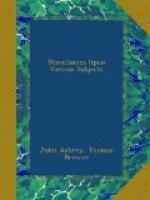Then the Crusado’s to the Holy War were most magnificent and glorious, and the rise, I believe, of the adventures of knights errant and romances. The solemnities , of processions in and about the churches, and the perambulations in the fields, besides their convenience, were fine pleasing diversions: the priests went before in their formalities, singing the Latin service, and the people came after, making their good-meaning responses. The reverence given to holy men was very great. Then were the churches open all day long, men and women going daily in and out hourly, to and from their devotions. Then were the consciences of the people kept in so great awe by confession, that just dealing and virtue was habitual. Sir Edwyn Sandys observed, in his travels in the Catholic countries, so great use of confession as aforesaid, that though a severe enemy to the Church of Rome, he doth heartily wish it had never been left out by the Church of England, perceiving the great good it does beyond sea. Lent was a dismal time, strictly observed by fasting, prayer, and confessing against Easter. During the forty days, the Fryars preached every day.
This country was very full of religious houses; a man could not have travelled but he must have met monks, fryars, bonnehommes, &c. in their several habits, black, white, grey, &c. And the tingle tangle of their convent bells, I fancy, made very pretty musick, like the college bells at Oxford.
Then were there no free-schools; the boys were educated at the monasteries; the young maids, not at Hackney schools, &c. to learn pride and wantonness, but at the nunneries, where they had examples of piety, humility, modesty, and obedience, &c. to imitate and practise. Here they learned needle-work, and the art of confectionary, surgery, physick, writing, drawing, &c.
Old Jaques (who lived where Charles Hadnam did) could see from his house the nuns of the priory of St. Mary’s (juxta Kington) come forth into the nymph-hay with their rocks and wheels to spin, and with their sewing work. He would say that he hath told threescore and ten; though of nuns there were not so many, but in all, with lay-sisters, as widows, old maids, and young girls, there might be such a number. This was a fine way of breeding up young women, who are led more by example than precept; and a good retirement for widows and grave single women, to a civil, virtuous, and holy life.
Plato says, that the foundation of government is, the education of youth; by this means it is most probable that that was a golden age. I have heard Judge Jenkins, Mr. John Latch, and other lawyers, say, that before the Reformation, one shall hardly in a year find an action on the case, as for slander, &c. which was the result of a good government.




